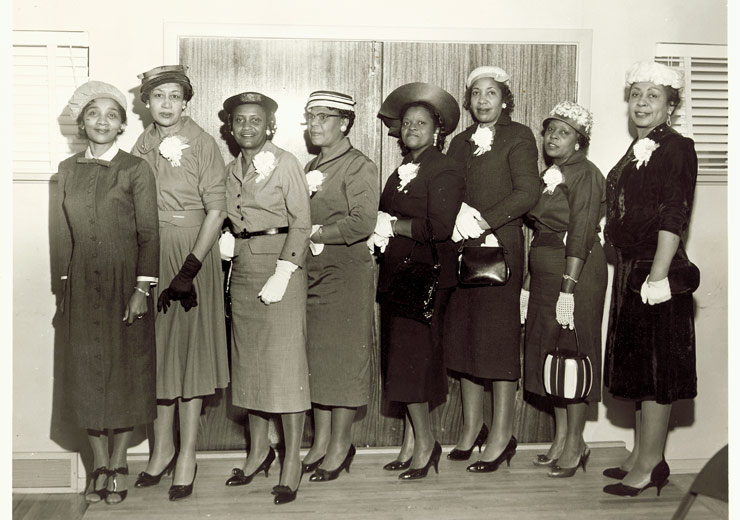The Texas Association of Women’s Clubs
Founded: In 1905 as the Texas Federation of Colored Women’s Clubs. In 1906, they affiliated with the National Association of Colored Women’s Clubs, and in 1956 the organization converted into the Texas Association of Women’s Clubs.
Noted For: Suffrage promotion, community service, issue awareness, and cultural and educational programming.
Women’s clubs (sometimes called “women’s circles”) were an important aspect of life in African-American communities in the late 19th and early 20th centuries. Not only did these organizations provide women with social and intellectual outlets, they served as resources—and sometimes change agents—for issues that were important to African-American women, including health care, education, home economics, poverty, and social reform.
The most prominent network of black women’s clubs in Texas was the Texas Association of Women’s Clubs* (TAWC), which began life as the Texas Federation of Colored Women’s Clubs (TFCWC) in 1905. Organized by Mrs. M.E.Y. Moore of Gainesville, TX, the TFCWC sought to improve the lives of black families and communities, drawing inspiration from the organization’s motto, “Lifting As We Climb.”
The club sponsored educational and cultural programs for both members and the larger community, and provided speakers for other community events. During World War I, members supported the Red Cross, led supply drives, and organized recreational activities for servicemen, in addition to other wartime efforts.
In 1917, African-American women in Galveston, TX formed a women’s suffrage organization. That same year, the TFCWC also formally endorsed votes for women.
In fact, black women’s clubs across Texas were eager to take up arms in the battle for votes for women, but the entrenched racism of the era thwarted most of their efforts to join their white women’s clubs counterparts in the statewide suffrage campaign.
After the Texas Legislature opened up the 1918 primary to allow women to vote, black women were permitted to register. But come election day, most were turned away by polling place officials on the “legal” basis that the primary was open to whites only. Conditions unfavorable to black suffrage would persist for the next several decades, in the form of segregated primary elections, poll taxes, election “literacy tests”, and Klan-sponsored intimidation.
Despite these barriers, black women in Texas did manage to achieve a few milestones in civic enfranchisement during the suffrage era. Three African-American women from Houston were named as candidates for state and county office on the 1920 Republican ticket, and when the election was held later that year, the Houston Post reported that black women were able to vote in “considerable numbers”.
These early victories were outcomes of the infrastructure for civic involvement created by early 20th century women clubs, a foundation that would lead to later gains in both voting access and increased political leadership for all Texas women during the civil rights era.
Additional Reading:
“Black Women in Texas History” by Merline Petre and Bruce Glasrud
Black Texas Women: 150 Years of Trial and Triumph” by Ruthe Winegarten
*TAWC is also sometimes known as the Texas Association of Colored Women’s Clubs, or TACWC.

